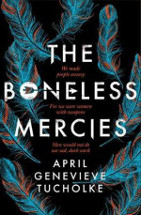The Boneless Mercies by April Tucholke

Simon and Schuster, 2018. ISBN 9781471170003
(Age: Mature 14+) Highly recommended. Themes: High Fantasy, Death.
Certain to appeal to young adult fans of medieval epics, this
macabre group of heroines will attract an even wider audience. In
the male dominated Vorseland, orphaned girls who want escape life in
a brothel could be apprenticed to black-cloaked mercy killers. A
band of nomadic Boneless Mercies may be hired specifically to carry
out assisted suicide for the terminally ill - with the exception of
the occasional abusive husband or revenge kill. Aging Siggy's last
apprentices: Frey, Ovie, Runa and Jupiter are skilled in both
stealth and homicide. With Siggy gone, Frey leads the Mercies and
one by one their pasts are revealed to their 17 yr old leader.
Trigve is a tolerated travelling companion, but as a male he can
never be a Mercy, a job for women only. 'Men will not do this sad,
dark work.'
Without Siggy's guidance, the girls survive but despair of mercy
killing - murdering children in particular. Alternatively, they seek
glorious battles for their considerable skills and Frey leads her
willing band on a series of noble quests. They renounce their trade
with an initial goal to slay the Blue Vee monster and end the
giant's carnage in Jarl Roth's northern kingdom. The reward money
will give them all future security. On route to Blue Vee, they are
side-tracked by further adventures; liberating the victims of evil
Jarls, making deals with self-serving Sea witches and ending the
malevolent reign of the powerful Cut-Queen.
Unlike other Mercy bands or the insular Sea Witches, Frey's group
occasionally accept the comradery of worthy males who become
embroiled in their battles. Inspired by the saga of Beowulf, these
adolescent girls are clearly in charge. Frey's first-hand narration
with an undercurrent of free love and extreme violence makes this a
novel for mature readers. But a wise woman's universe has no
absolutes - Frey never compromises her understanding of the
complexity of the human condition, where destructive cycles are
broken only by acknowledging all victims - including the monsters
themselves.
Deborah Robins